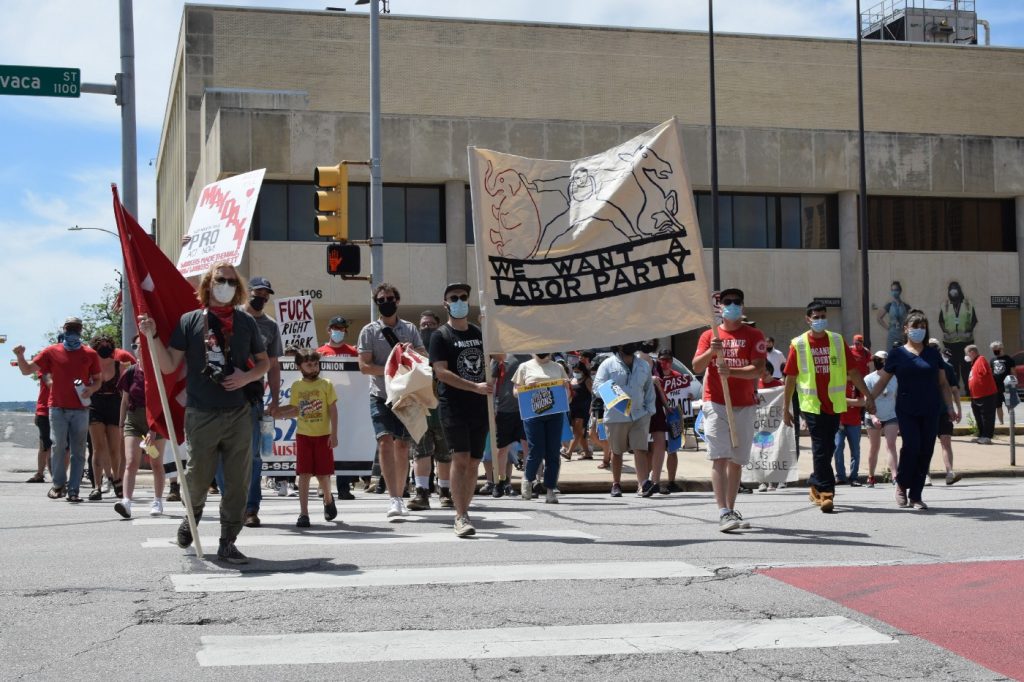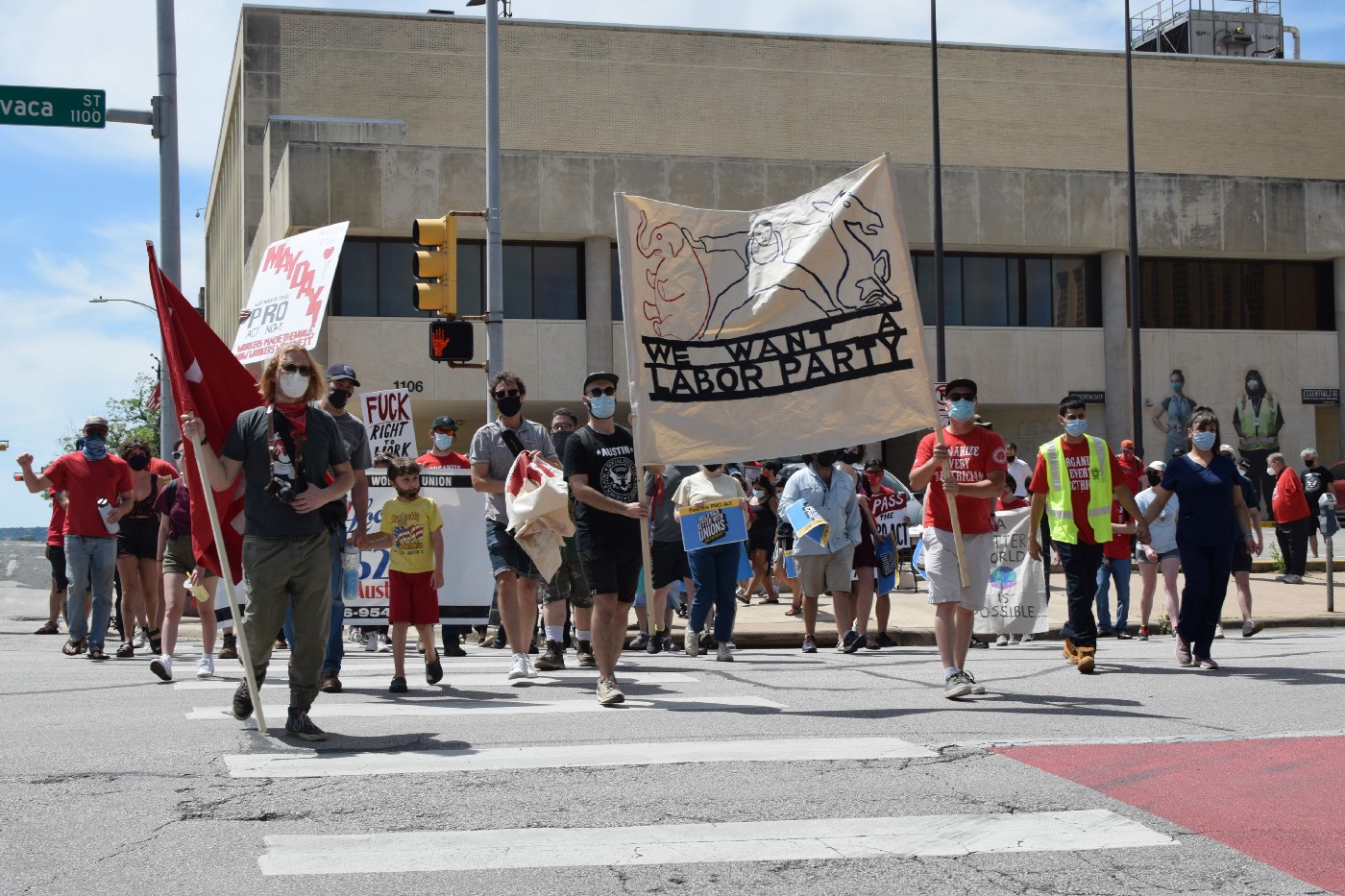Bosses have two parties. If we want to build power for our class and eventually transform society, workers are going to need one too.
By Jake J.

If you’ve ever worked for a living, chances are you’re a member of the working class along with the great majority of Americans. Most Americans do not live off of inherited wealth or off of wealth expropriated from the labor of others but are forced to live, in one way or another, off of their labor. This class includes varied strata who differ in their backgrounds, wage laborers, salaried employees, homemakers, unemployed people, retirees, etc., all of whom are united in their collective interest in changing the present order. This majority is put out by those who rule our political and economic order, the capitalist class who own the tools of production and control the lion’s share of wealth in our country.
Even though the working class makes up a large majority in the United States, they are sorely lacking in political representation. Very few elected representatives are workers and in fact a disproportionate amount of them are millionaires. Some politicians tout their working-class bona fides as a rhetorical tool, but their backgrounds usually have no bearing on their actual politics. They feel fortunate to have escaped their humble beginnings and owe their loyalty to the ruling class which they now represent. It’s no accident that working-class people are underrepresented in the halls of government. For one, bosses have a near-total monopoly on power, not just in the workplace but also in politics where they currently hold an ironclad veto on legislation that runs counter to the economic interests of this exploiting minority. Bosses are also fortunate enough to have these economic interests safeguarded by not one, but two, major political parties. The Democrats and Republicans, despite their slight differences, represent the same fundamental commitment to business as usual: continual exploitation, environmental destruction, and anti-worker austerity. Besides being ideologically committed to the continuation of the capitalist system because of their own social and economic backgrounds, representatives of the Democratic and Republican parties are also financially incentivized to keep the bosses’ best interests at heart. It is capitalists who bankroll both Democratic and Republican election campaigns (often simultaneously) and persistently lobby their politicians to make sure they are steadfast in their opposition to legislation like Medicare for All which runs counter to their desire to rake in ever-increasing profits in perpetuity.
There is another side to the coin of American politics. Unions, progressive groups, and other worker-led organizations also fund election campaigns and lobby politicians for the interests of their class. By engaging in these tactics, these groups are frequently able to bring home the goods for working-class people. The persistent pressure of DSA, various unions, and progressive groups like the Sunrise Movement has certainly made an, albeit small, mark on the Biden administration. One example is found in the child benefit enacted under Biden which will drastically reduce poverty in this country but is nonetheless means-tested and short term in its focus. Efforts to pressure the Democrats have limited efficacy. The working class is not able to reliably score victories through these methods because ultimately, the bosses and their representatives at all levels of government hold the levers of power. The scope of these victories is also limited. While we may be able to win mild expansions of the welfare state and the continuation of protections like the eviction moratorium using this limited set of tactics, we are still largely unable to attack the core logic of the capitalist system and hit the bosses where it hurts most: their wallets.
This is not to discount the victories that we can win through applied pressure, only to suggest that they are insufficient in the face of the issues we are facing as a class. We can’t rely on capitalist representatives to look out for working-class interests. No amount of coordinated grassroots pressure will change the fact that establishment politicians from both parties are captives in service of capitalist interests. No amount of goodwill or high morality will override base greed and financial interest. Any establishment politician is happy, so long as they are personally comfortable, to let capitalists reign as they please even while millions are immiserated. It’s much easier, from the perspective of a ruling-class Democratic or Republican politician, to let the current order of things continue undisturbed than to stick your neck out and try to make a change.
At various points in the past century, working-class activists have attempted to “realign” the Democratic Party and create a genuine mass workers party in the process. Two historical examples are illustrative. During the New Deal era, the Communist Party (CP) entered a tactical alliance with the Democratic Party toward the goal of winning permanent gains for the working-class as part of the so-called “Popular Front” strategy. Through the Popular Front, the CP was able to score victories for the working class and grow their membership significantly. The strategy was in the long term, however, a failure. The CP was essentially subsumed into the Democratic Party for a decade, derailing their efforts to create independent political power for the working class and forcing them into obsequious servitude to the Democratic Party’s interests in the meantime. The most disastrous consequence of this failed attempt at realignment is engendered by the enforcement of the “no-strike pledge” during the Second World War. The CP, once a bastion of worker militancy, upheld the no-strike pledge to a tee, going so far as to break up picket lines, which destroyed their credibility with the organized working class.
The second example is found in the 60s and 70s, when left-wing activists from the labor and Civil Rights movements attempted to promulgate a leftward shift in the Democratic Party. The efforts of Civil Rights activists like Bayard Rustin in party politics were successful in ejecting southern racists from the party, but other gains were limited. While left-wingers like Rustin and Max Shachtman were successful in some areas in promoting their politics, they were also effectively subsumed into the Democratic Party and were forced to moderate their principles for ‘pragmatic’ political purposes. For these reasons, figures like Rustin refused to publicly oppose the War in Vietnam out of fear that it would damage the fragile New Deal coalition. The economic crisis of the mid-70s and the subsequent right-wing lurch of the Democratic Party establishment wrecked left-wing hopes of transforming the Party into a political home for working-class people. By the late 70s, left-wing activists had largely given up on realignment and were forced into the position of blindly supporting Democratic Party leadership.
What lessons should people today take from these historical examples? First of all, both major parties in this country are fundamentally captive to the interests of the ruling capitalist class. This is borne out in the two examples cited above. In both instances, the concerted efforts of left-wing groups to transform the Democratic Party into a workers party were subverted by the very nature of the party into which they entered. Today’s socialists could perhaps capture state and local party organizations, get involved in Democratic Party clubs, and get resolutions passed at local and national party conventions. What good would that do, though? If the history of past realignment attempts is any indication, not much. The small gains we could make from such efforts would not be worth the gargantuan amount of organizing it would take to just get our foot in the door. It’s also worth remembering that the elected leadership of the party are not the ones really in control, even they are under the discipline of the millionaire and billionaire donors. A modern-day effort to transform this party into a labor party would, based on the American political landscape and the history of past attempts, end largely in the same way that the attempts of the 30s or 60s/70s ended: with working-class left-wingers carrying water for capitalists, forced to defend the establishment of the party over which they have taken stewardship and forced to abandon hopes of actual political representation for the working class.
Instead of wasting our time meddling in the affairs of a fundamentally capitalist party like the Democrats, we should be working right now to lay the groundwork for an independent labor party with a democratic socialist orientation. Toward this end, DSA is committed to a strategy of “tactically contesting partisan elections on the Democratic ballot line while building power independent of the Democratic party apparatus.” To avoid the third-party spoiler effect, socialists and progressives today who agree that we need a party for workers should continue to use the Democratic ballot line while maintaining political independence from the Democrats and being openly hostile to the Democratic Party establishment. Tactical use of the Democratic ballot line has given us access to a broad base of millions of working-class people to whom we can broadcast our politics with the class struggle campaigns of national figures like Bernie Sanders and AOC and local figures like José Garza, Jabari Brisport, and Phara Souffrant Forrest.
Moving forward, we must focus particularly on cultivating the identity of “democratic socialist” among working-class voters and pushing more and more people to think of themselves as members of a class through our campaigns. Mass political work is a key component in forming the class for itself that we will need to constitute a working-class movement and party in this country. By engaging in election campaigns, protest movements against racist police violence and anti-immigrant policy, and agitating for legislation like Medicare for All, we can further polarize our society along class lines. Workplace organizing must be at the base of any attempt to create a party for workers. In particular, we must embed ourselves in the rank-and-file of labor unions, toward the goal of strengthening the labor movement and promoting political independence from the Democratic Party among union members and union locals. As with all other historical labor parties, the American labor party of the future must be partly the creation of the largest and strongest class organizations in the country: unions.
To build a powerful working class, we need to not only raise class consciousness among workers but also find our political expression in a mass party. Certainly building a party will be no easy task, but the pursuit of emancipatory politics never has been easy. Only the working class is capable of liberating itself and creating a society free from exploitation and oppression. Let’s get to work on making that liberation a reality.

